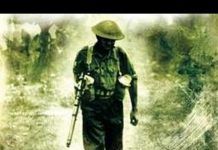Embark on a sobering exploration into the darker corners of history with “Laughing With Hitler,” a documentary that unveils the clampdown on satire and undesirable comedians during the ascent of the Third Reich. Amidst the colossal human cost of World War II, this film peels back layers to illuminate the plight of specific groups, particularly comedians, whose expressions of humor faced suppression under Nazi rule. Initially, the documentary reflects on the paradoxical reality where satire and jokes at Hitler’s expense were somewhat encouraged during his rise to power. However, as the regime solidified its control, anything deemed subversive was systematically eradicated, and making such jokes became increasingly perilous.
The narrative takes a poignant turn as it recounts the stories of German comedians sentenced to hard labor in camps or even death for daring to mock the authoritarian regime. Through well-chosen recollections from individuals who lived through this ominous period, the film unveils the chilling consequences faced by those who sought to bring levity to a society under the shadow of oppression. The shocking tales serve as a stark reminder of the drastic measures taken to stifle dissent and control narratives during a time of authoritarian rule.
As “Laughing With Hitler” progresses, it broadens its focus to explore the general sense of humor that emerged on the streets as the war turned against German cities and civilians. In the face of adversity, gallows humor became a coping mechanism, a way for people to navigate the grim realities of wartime Germany. The documentary captures the resilience of the human spirit through the recreation of jokes by two German comedians, adding an authentic touch to the historical accounts. This examination of humor under duress becomes a lens through which we can understand how people grappled with the unimaginable challenges of their time.
In conclusion, “Laughing With Hitler” transcends its title’s initial shock factor to offer a nuanced portrayal of a dark chapter in history. It highlights the evolving nature of humor—from initial permissibility to subsequent danger—and how laughter became both an act of rebellion and a survival mechanism. The film, through powerful recollections and recreated jokes, invites viewers to contemplate the human cost of censorship and the resilience of humor even in the bleakest of circumstances.

































